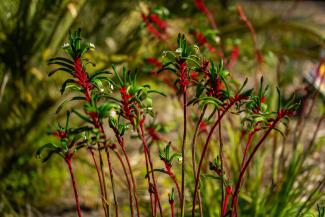Bushland conservation and restoration
We are working together on vital conservation and ecological restoration efforts to protect our precious bushland species.
Strong community support for the conservation of Kings Park and Bold Park bushlands has led to significant restoration activities over many years.
These activities restore diverse, representative, regionally integrated and self-sustaining native ecological communities (to the extent that is possible in an urban setting) and in doing so, aim to honour Whadjuk Noongar heritage.
By improving the condition of the bushlands, they will become better refuges and ecological linkages for biodiversity, while also helping to restore people’s relationship with nature and guaranteeing the enjoyment of these special places by future generations.
How we’re protecting the bushland of Kings Park
To restore our precious bushland in Kings Park we have worked on more than 80 restoration sites, ranging from less than 1 ha to 40 ha. The Friends of Kings Park Bushland Carers work closely alongside the Kings Park Bushland team.
How we’re protecting the bushland of Bold Park
We have undergone significant restoration works in Bold Park, which supports 442 ha of undulating woodlands, heaths and coastal dunes. It has a greater diversity of ecological communities than Kings Park, and restoration efforts are focused within nine main precincts. The Friends of Bold Park Bushland support the Bold Park Bushland team on restoring bushland areas.
Making a difference
Since restoration began, native plant abundance and species richness has increased in both bushlands. Two decades of work in Kings Park and Bold Park has shown that restoration can help push back against threatening processes, but interventions to reverse degradation are still very much needed, particularly given the drier and hotter conditions predicted for this region.
How you can help us protect our bushland
The bushland is there to be enjoyed by Perth locals and our many visitors, but we all need to work together to preserve it for future generations. Please help us by:
- staying on the paths
- leave flora, fungi and fauna alone
- stay to designated cycling areas
- take your litter with you
- keep your dog on a lead
- join a volunteer group



